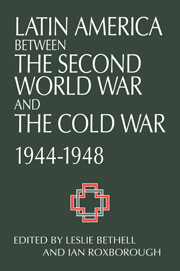Book contents
- Frontmatter
- Contents
- List of contributors
- Preface
- Introduction: The postwar conjuncture in Latin America: democracy, labor, and the Left
- 1 Brazil
- 2 Chile
- 3 Argentina
- 4 Bolivia
- 5 Venezuela
- 6 Peru
- 7 Mexico
- 8 Cuba
- 9 Nicaragua
- 10 Costa Rica
- 11 Guatemala
- Conclusion: The postwar conjuncture in Latin America and its consequences
- Index
11 - Guatemala
Published online by Cambridge University Press: 04 May 2010
- Frontmatter
- Contents
- List of contributors
- Preface
- Introduction: The postwar conjuncture in Latin America: democracy, labor, and the Left
- 1 Brazil
- 2 Chile
- 3 Argentina
- 4 Bolivia
- 5 Venezuela
- 6 Peru
- 7 Mexico
- 8 Cuba
- 9 Nicaragua
- 10 Costa Rica
- 11 Guatemala
- Conclusion: The postwar conjuncture in Latin America and its consequences
- Index
Summary
The experience of Guatemala during the decade following the Second World War was exceptional within Latin America. As in most of Central America, an antidictatorial movement strongly influenced by the war took root in 1944. However, in contrast to all of the countries of the isthmus (except Costa Rica), this movement succeeded not only in overthrowing a dictatorship established in the wake of the Depression-that of General Jorge Ubico (1931-44)-but also in resisting the ensuing right-wing backlash. Then, in contrast to the general trends in Latin America as a whole (except Argentina), the regimes of Juan Jose Arevalo (1945-51) and Jacobo Arbenz (1951-4) for almost a decade pursued policies of progressive socioeconomic reform, accepted and sometimes encouraged the spread of unionization, and fostered a nationalist sentiment that increased pressure on foreign enterprise and tension with the United States. In contrast to the Peronist experience in Argentina, the Guatemalan governments desisted from taking a resolutely anti-Communist line and came to rely on the support of independent radical forces in the labor movement. As a result, the Arbenz regime was eventually overthrown, in perhaps the most open and emphatic example of U.S. Cold War interventionism to be seen in Latin America, when the CIA organized a counterrevolutionary invasion from Honduras in June 1954.
The counterrevolution, or “liberation,” of 1954 may be seen as marking Guatemala's overdue reversion to the pattern of regional politics, although it was precisely by virtue of the long delay that the reactionary backlash was so singular in its degree of public and covert U.S. backing, and in its consolidation of an anti-Communist political culture that subsequently impeded event the most modest reforms for over three decades.
- Type
- Chapter
- Information
- Latin America between the Second World War and the Cold WarCrisis and Containment, 1944–1948, pp. 300 - 326Publisher: Cambridge University PressPrint publication year: 1993



